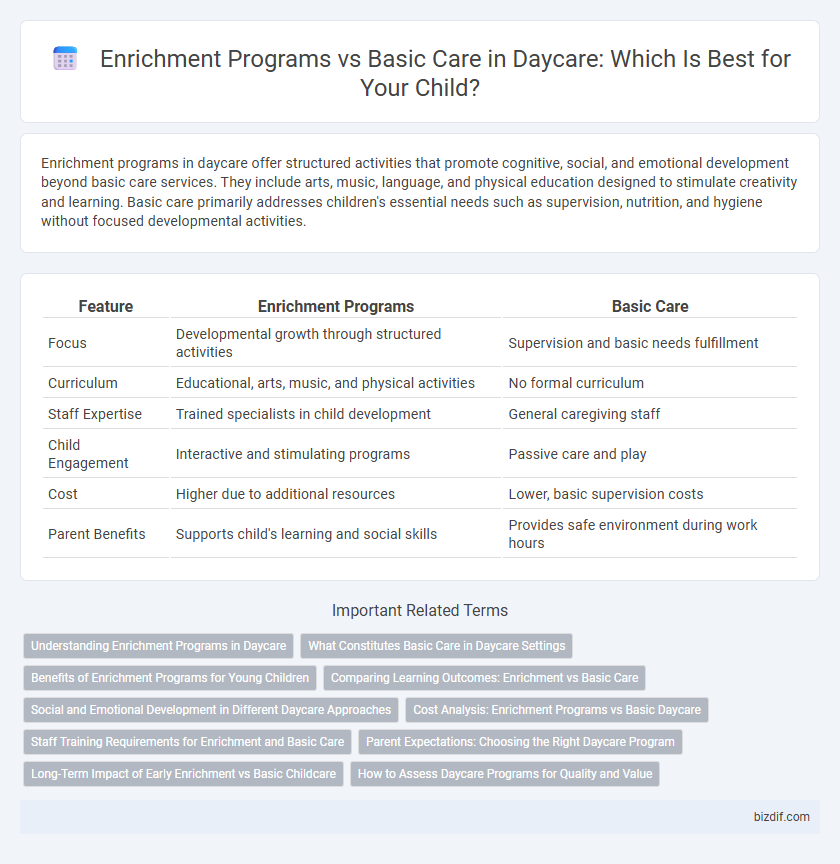Enrichment programs in daycare offer structured activities that promote cognitive, social, and emotional development beyond basic care services. They include arts, music, language, and physical education designed to stimulate creativity and learning. Basic care primarily addresses children's essential needs such as supervision, nutrition, and hygiene without focused developmental activities.
Table of Comparison
| Feature | Enrichment Programs | Basic Care |
|---|---|---|
| Focus | Developmental growth through structured activities | Supervision and basic needs fulfillment |
| Curriculum | Educational, arts, music, and physical activities | No formal curriculum |
| Staff Expertise | Trained specialists in child development | General caregiving staff |
| Child Engagement | Interactive and stimulating programs | Passive care and play |
| Cost | Higher due to additional resources | Lower, basic supervision costs |
| Parent Benefits | Supports child's learning and social skills | Provides safe environment during work hours |
Understanding Enrichment Programs in Daycare
Enrichment programs in daycare centers provide children with structured activities designed to enhance cognitive, social, and emotional development beyond basic care services. These programs often include language learning, music, art, and physical education, fostering creativity and critical thinking skills in early childhood. Understanding the benefits of enrichment programs helps parents choose daycare options that support holistic growth and school readiness.
What Constitutes Basic Care in Daycare Settings
Basic care in daycare settings encompasses essential services such as supervision, feeding, diapering, nap times, and ensuring a safe environment for children. These fundamental activities support children's well-being and developmental milestones but do not typically include structured learning or skill-building activities. Enrichment programs, on the other hand, introduce educational play, music, language development, and social skills to enhance early childhood growth beyond basic needs.
Benefits of Enrichment Programs for Young Children
Enrichment programs in daycare offer young children advanced learning opportunities through activities that promote cognitive, social, and emotional development beyond basic care services. These programs include language immersion, STEM exploration, and creative arts, which enhance critical thinking and communication skills essential for early childhood growth. Research shows children engaged in enrichment programs exhibit improved school readiness, increased attention spans, and stronger problem-solving abilities compared to peers receiving standard care.
Comparing Learning Outcomes: Enrichment vs Basic Care
Enrichment programs in daycare settings significantly enhance learning outcomes by incorporating structured activities that promote cognitive, social, and emotional development beyond basic care. Studies show children in enrichment programs develop advanced language skills, problem-solving abilities, and social interaction compared to peers receiving only basic supervision and care. The inclusion of specialized curriculum components such as music, art, and early literacy contributes to improved school readiness and long-term academic success.
Social and Emotional Development in Different Daycare Approaches
Enrichment programs in daycare emphasize social and emotional development by incorporating structured activities like group play, emotional literacy exercises, and conflict resolution strategies that foster empathy, communication skills, and self-regulation. Basic care approaches primarily focus on meeting children's physical needs such as feeding, hygiene, and safety, often lacking targeted efforts to cultivate social interactions and emotional growth. Research shows that children in enrichment-focused daycare settings exhibit stronger peer relationships and improved emotional resilience compared to those receiving only basic care.
Cost Analysis: Enrichment Programs vs Basic Daycare
Enrichment programs in daycare typically incur higher costs due to specialized activities, additional staff qualifications, and enhanced learning materials compared to basic care, which primarily covers supervision and fundamental needs. Cost analysis reveals that enrichment programs can increase monthly fees by 20-40%, reflecting investments in cognitive and social development opportunities. Families should weigh these expenses against the potential long-term benefits of early childhood education and skill-building activities versus the affordability of standard daycare services.
Staff Training Requirements for Enrichment and Basic Care
Enrichment programs in daycare require staff to have advanced training in child development, creative curriculum design, and specialized activity facilitation, ensuring a stimulating educational environment. Basic care staff primarily need certifications in child safety, hygiene, and basic caregiving skills to maintain a secure and nurturing setting. Ongoing professional development is essential in enrichment settings to adapt to evolving pedagogical standards and support children's cognitive and social growth effectively.
Parent Expectations: Choosing the Right Daycare Program
Parents seeking daycare prioritize enrichment programs that offer cognitive, social, and emotional development activities beyond basic care, which typically includes supervision and meal provision. Research shows that children in enrichment-focused daycares demonstrate enhanced language skills and executive functioning compared to those receiving only fundamental care. Selecting a daycare aligned with parental expectations involves evaluating curriculum quality, caregiver qualifications, and opportunities for creative and physical growth.
Long-Term Impact of Early Enrichment vs Basic Childcare
Early enrichment programs in daycare settings significantly enhance cognitive, social, and emotional development compared to basic childcare by providing structured activities that stimulate critical thinking and creativity. Research indicates children exposed to enriched environments demonstrate higher academic achievement and improved problem-solving skills well into adolescence. These long-term benefits highlight the importance of integrating developmental-focused enrichment activities rather than solely providing supervision and basic care.
How to Assess Daycare Programs for Quality and Value
Evaluating daycare programs requires examining enrichment offerings such as language development, STEM activities, and social-emotional learning alongside basic care elements like safety, hygiene, and staff-child ratios. Quality indicators include accreditation status, caregiver qualifications, curriculum structured to age-specific developmental milestones, and measurable outcomes in cognitive and motor skills progress. Prioritizing programs that balance comprehensive enrichment with foundational care ensures optimal value and fosters holistic child development.
Enrichment programs vs basic care Infographic

 bizdif.com
bizdif.com